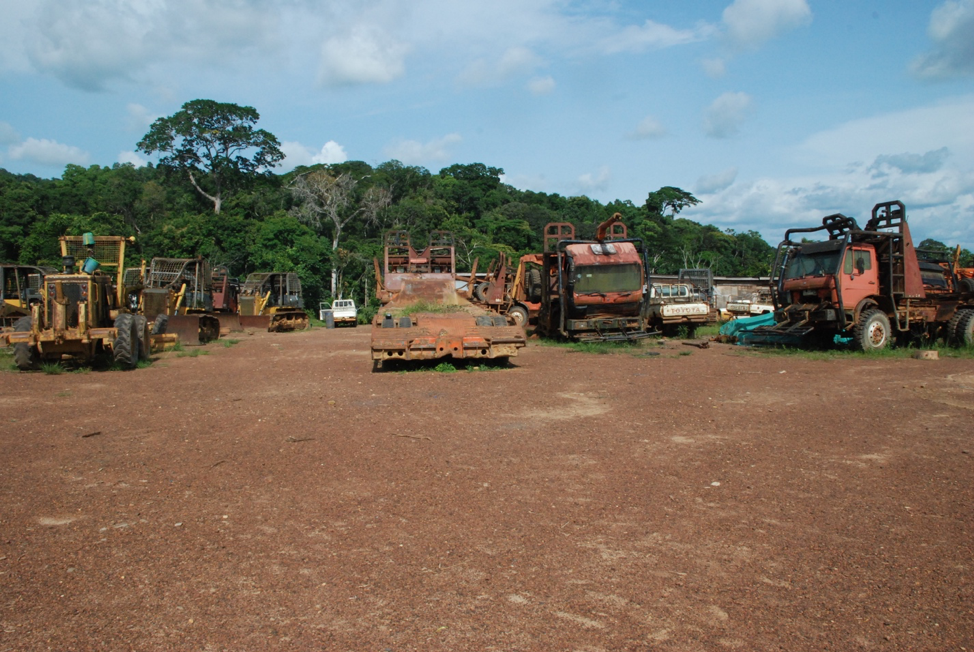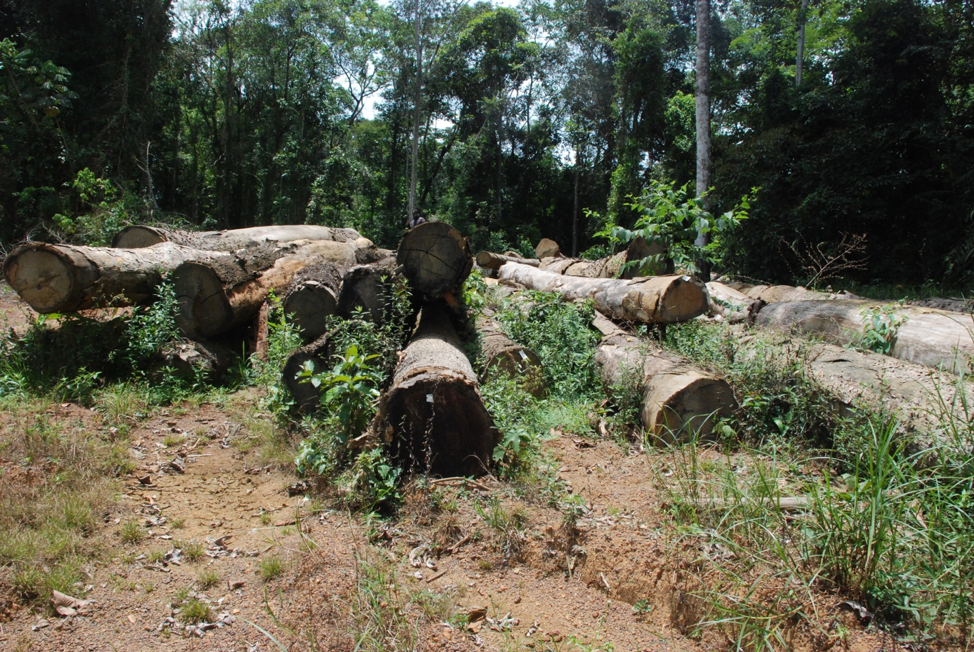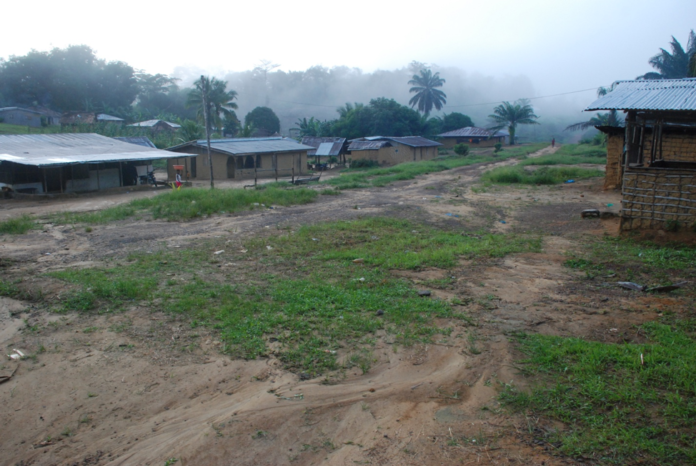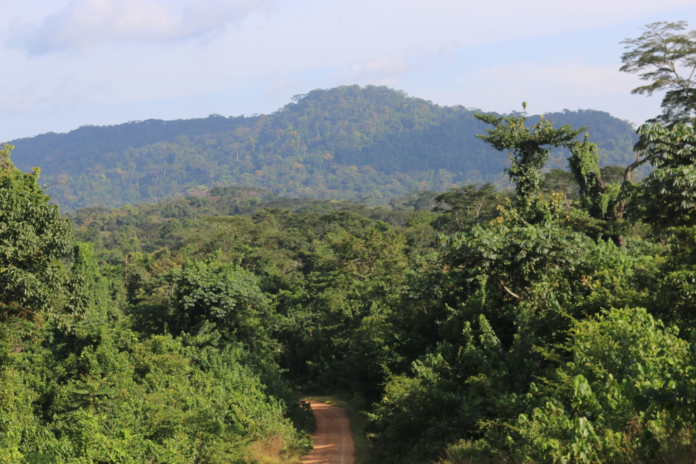Top: Villagers in Bahn Town, the headquarters of Jo River and Nyorwein Community Forest, are excited they can now benefit from their forest. The DayLight/Emmanuel Sherman
By Emmanuel Sherman
NYORWEIN, RIVER CESS – Throughout the two bordering clans of Jo River and Nyorwein far away in the Central River Cess District, villagers expect their logging agreement with Magna Logging Corporation to bring much-needed development to their community.
The newest among 49 authorized community forests across the country, they have leased their land in exchange for roads, toilets, scholarships and clinics, according to the agreement. Those benefits aside, Magna is required by the Community Rights Law of 2009 with Respect to Forest Lands to pay affected communities for use of their land and each log it harvests in the 39,000-hectare forest.
But their hopes could be dashed, given the nature of the logging industry, particularly, community forestry. The 12 years of community forestry has been spiteful rather than sparkling for many communities. Forestry Development Authority (FDA) appears to side with companies more. There are reports of illegal logging in several communities. Companies and individuals are abandoning woods they harvest at an alarming rate, owe communities thousands of United States dollars and the FDA approves new contracts for them.
Jo River & Nyorwein does not have to look far for some of these grim examples. Between 2020 and last year, African Wood and Lumber Company, another logging firm, illegally cut 550 logs in the Gbarsaw & Dorbor Community Forest. The FDA representative responsible for the county was suspended and replaced. It owes that community thousands and has yet to conduct mandatory projects.
Similarly, in Ziadue & Teekpeh signed three years before Jo River & Nyorwein, Brilliant Maju and E&J Investment Corporation have not lived up to their agreement with the community. The company duo has failed to implement projects, sparking protest last year. Following the hostilities, it made a commitment to construct eight handpumps and two latrines in affected communities between September last year to February this year but has not completed them.
By the way, these industry woes are already at Jo River & Nyorwein’s doorsteps. Before its contract with the villagers here, Magna had not lived up to its agreement with Worr Community Forest in Compound One, Grand Bassa County. (It had paid Worr all its land rental, harvesting and scholarship fees, though.) When it signed the agreement in August last year, the company had not done any roads, still had to complete five handpumps, and had not rehabilitated a clinic it agreed to do by that time.

Magna is also in breach of its contract with Jo River & Nyorwein. The company has yet to begin operation since signing the agreement in August last year. It also has not paid its land rental fees of US$26,105 to the community. It has not done a major road leading to the forest, something locals consider a priority, according to the agreement.
“We really need roads, where there is a road there is life,” says Philip Ben, one of the community’s leaders in an interview with The DayLight in Buchanan.
“Since we signed the agreement last year, we have not had a meeting with them again,” says Alice Giahyou, another member of the leadership. The agreement mandates the villagers and the company to hold periodic meetings whose expenses the company must underwrite.
Molley Kamara, the owner of Magna says the meeting will be held in a week’s time. “There is a community meeting on August 20. I am pretty sure the community’s concern will be addressed,” Kamara tells The DayLight in an email.
“First, it is less than one year ago [since] we signed with Jo River [& Nyorwein]. And we are not worried,” Kamara adds.
Jo River & Nyorwein has its own internal problems. Ben, Giahyou, and have capacity problems and no knowledge of forest governance. Its leadership is not aware of the sector practices and legal frameworks.
“We know some of our rights… but we don’t understand all,” Giahyou adds.
There were indications the leadership of the community are not aware that their agreement with Magna is a public contract. Ben refused to share a copy of the agreement with The DayLight. He initially accepted to give our reporter the agreement, following a week of discussion. When the reporter finally tracked him down at his Worldwide Church in Buchanan, he asked the reporter to first buy legal papers to photocopy the documents. But he stormed out of the arrangement when the reporter came back with the papers. The reporter then demanded he repays the funds used to purchase the papers. Ben refused to repay until the intervention of members of the church.
Paul Nickerson, the head of the community leadership, also refused to share a copy of the agreement with The DayLight while in Monrovia in July. Nickerson eluded us three times before he stopped answering his phone. He only phoned us when he was already back in River Cess.
Weedor Gray, the technical manager for FDA’s community forestry department did not grant The DayLight’s request for access to the agreement, though the document is a public record. No contracts are available on the agency’s website as required by the National Forestry Reform Law. We obtained it from elsewhere. Gray did not return our emailed request for comments.
The Answer is Women’s Participation
Foundation for Community Initiative (FCI), which promotes the empowerment of women and youth in the natural resource sector, has begun working with Jo River & Nyorwein to strengthen its capacity. The four-year project encourages women like Giahyou to participate in the governance of the forest. It has been holding community meetings and using local radio stations to raise awareness in the area.
With funding from the Norwegian Agency for Development Cooperation (NORAD), FCI will also work in Ziadue & Teekpeh, according to a document on the project.
“Jo River and Nyorwein have a lot more to do, their knowledge and skill in forest governance are very limited,” says Felix Foyah, a campaigner of FCI who works on the project.
Foyah says FCI is building on the important relationship women play in forestry to help Jo River & Nyorwein meet the challenges in the sector. Women tend to use forest resources more than men. Many women know which trees are for food and medicine, and how to conserve forests—important knowledge during food crises, according to the FAO. Evidence shows that increased women’s participation in community-forest leadership improves forest governance and sustainability, according to a 2019 report.

“That is exactly what we hope to achieve. Once there are more knowledgeable women on forest matters that are in the community leadership, they can better combat illegal logging, deforestation and forest degradation,” says Foyah. Only five out of nearly 50 members of the leadership of Jo River & Nyorwein are women.
“We know that there are a lot of issues in forestry,” he adds, “but that is how we can solve those problems.”
Zahn Dehydugar of the Community of Forest and Environmental Journalists of Liberia (CoFEJ) contributed to this report.
Funding for the story was provided by the Foundation for Community Initiatives (FCI). The DayLight maintained complete editorial independence over its content.


